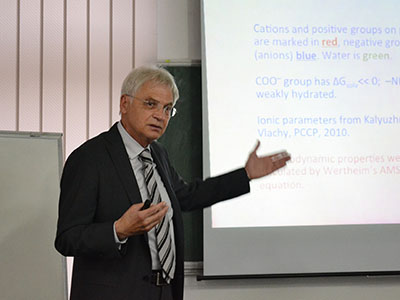About Institute / Doctors honoris causa / Vojko Vlachy
Vojko Vlachy
 By the decision of the Scientific Council of the Institute for Condensed Matter Physics of the National Academy of Sciences of Ukraine of March 6, 2017 the degree of Doctor honoris causa was conferred on Vojko Vlachy (Ljbljana, Slovenia) for the outstanding contribution to theoretical and experimental investigations of the aqueous electrolyte and polyelectrolyte solutions, including colloidal and protein solutions and for establishing and strengthening cooperation between scientists of Ukraine and Slovenia.
By the decision of the Scientific Council of the Institute for Condensed Matter Physics of the National Academy of Sciences of Ukraine of March 6, 2017 the degree of Doctor honoris causa was conferred on Vojko Vlachy (Ljbljana, Slovenia) for the outstanding contribution to theoretical and experimental investigations of the aqueous electrolyte and polyelectrolyte solutions, including colloidal and protein solutions and for establishing and strengthening cooperation between scientists of Ukraine and Slovenia.
Vojko Vlachy was born on May 29th, 1946 in Ljubljana. He has graduated from the Faculty of Natural Science and Technology at University of Ljubljana (Slovenia) as a chemical engineer (Bsc, 1970) and obtained his MSc in Physical Chemistry in 1973. At the same University in 1978 he received his PhD degree. Since then all his professional and scientific activity is connected with the University of Ljubljana, where he has evolved from assistant professor to full professor of physical chemistry. During that time Vojko Vlachy several times received both national and international prestigious awards, including the Highest Slovenian National Award for Science (Zois Award, 1996), Fulbright Fellowship (1984–1986), in 2009 he was elected to the European Academy of Science and Arts. Besides that, due to his scientific achievements Vojko Vlachy has been repeatedly invited as a Visiting Professor to the following prestigious scientific institutions, such as the University of California in Davis and Berkeley (1984-1986, USA), University of Regensburg (2006, German) and University of Pierre and Marie Curie in Paris (2007, 2009, France), University of California at San Francisco (2006-2011 USA).
Vojko Vlachy has started his scientific career by theoretical and experimental studies of the influence of the polyion conformation on the thermodynamic properties of polyelectrolyte solutions. Later, at the beginning of 1980s Vojko Vlachy and co-workers perform the first systematic studies of the cylindrical double-leyer, carried out using Monte Carlo computer simulation methods, density functional theory (DFT), and modified Poisson-Boltzmann theory. Taking into account depletion interaction a theory for precipitation of the proteins have been developed together with J.Prausnitz (UC Berkeley) in 1990s. Of substantial importance are the studies of Vojko Vlachy and co-workers , in which, using Monte Carlo computer simulation methods it was demonstrated that in the presence of divalent counterions equally charged macroions form clusters. These studies have been carried out at the end of 1990s and since then have stimulated many papers dedicated to this counterintuitive effect. Substantial contribution toward understanding of ionic hydration has been made in the studies carried out at the beginning of 2000s. In 2008-2013 papers he showed that presence of hydrophobic groups causes reversal of the Hofmeister series. These studies provided insights, which proved useful in constructing explicit water theory for protein solutions. In this theory interaction between all particles of the system are accounted for on equal footing, including the ions and water.
During a number of years Vojko Vlachy was in close scientific contacts with the scientists of the ICMP NAS of Ukraine. First acquaintance of Prof. Vlachy with the scientists from the ICMP take place in 1990 during the 3rd Liblice Conference on the Statistical Mechanics in Behine (Czech Republic). Since then a continuous and successful scientific collaboration, which lasts for more than 26 years, have been initiated. During that time a regular mutual visits of the scientists of the ICMP and scientists of the Physical Chemistry Department of the University of Ljubljana took place. As a result of this cooperation around 40 joint scientific papers have been published. Vojko Vlachy actively participated in organizing and conducting many international conferences, which took place in Lviv. He is a member of the editorial board of the “Condensed Matter Physics” journal and his active contributor.